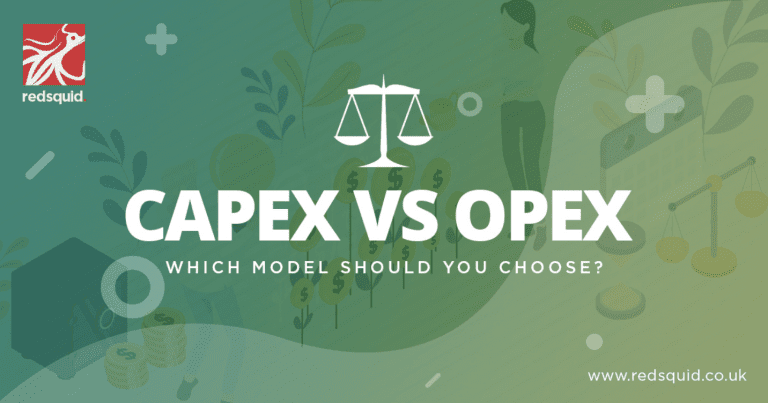Should I Choose a CapEx or OpEx Model When Buying New Technology?

Why is it important to invest in new technology?
How much is the UK tech industry worth? Well, last year’s financial figures recorded a value of more than £180 billion.
Growing UK businesses want to invest in new technology to help drive their profits and improve the way their employees work.
New technology can improve your productivity, overcome inefficiency, build business continuity, and save you money.

What makes investing in new technology so tricky?
Ensuring that something will be a worthwhile investment doesn’t only depend on the benefits that it might bring.
How quickly are you going see that money you invested return?
If you’re going to spend money on new technology, you need to justify the expenditure.
So where does CapEx and OpEx come into it?
What is CapEx?
This is a one-off capital expenditure for something that intended to return profits over several years through depreciation (which is when an asset’s value is gained back through use).
In other words, a CapEx investment is like buying a car outright: you’ll be paying upfront to own something that will decrease in value over time.
What is OpEx?
This is money put towards everyday expenses that are intended to return profit within the same month they’re purchased. Unlike CapEx, operational expenditure is tax-deductible and will be recorded within a company’s monthly financial reports.
Think of OpEx investments as like leasing a car: you pay a monthly fee, and eventually move onto another car once your contract is finished.

What are the main differences?
You might have already spotted the two main aspects that make CapEx and OpEx different:
- How much upfront investment is needed.
- How much time it takes to make the investment back.
CapEx is typically harder to get approved because it involves more up-front investment, and the profit returns come a lot slower.
Whereas OpEx expenses enable businesses to spread the cost, which makes getting a return on investment much quicker.
What are the benefits to CapEx?
Despite the expense, CapEx does come with its own advantages…
- You have complete ownership of the technology from the start.
- You won’t have to sign any contracts.
- You can choose when to upgrade or when buy a new system without any contract-related expense
What are the disadvantages to CapEx?
However, CapEx comes with its share of downsides…
- You will be expected to pay upfront capital, making it harder to clear with your company board.
- You will not be able to deduct any of the expenses from tax.
- You will have to scale and upgrade any technology yourself.
- You may have to hang onto any technology for longer than you’d like to get a full return on investment.
- You will have to maintain and support your own hardware.

What are the disadvantages to OpEx?
- You won’t actually own the hardware.
- You may be expected to upgrade to a new system once your contract is finished, rather than keep the hardware you’ve leased. This depends upon the contract.
- You will be expected to pay for termination fees if you wish to end the contract early.
- You may have to pay additional fees if you want to upgrade or refresh your contract. early.
- You may have less control over the maintenance and support of your hardware.
Start investing in new technology
Investing in new technology is essential for any business looking to grow and improve.
Relying on suppliers who can only offer CapEx models could leave your business stuck with aging technology or huge expenses.
Whereas OpEx finance models enable businesses to get the technology they want without being tied to heavy costs and equipment they don’t want.
But when choosing a finance model, it entirely depends on what’s right for your business. Find out more about how your business can get the technology it needs. Call our support team on 020 8166 4540 or get in touch using our webchat function below.
Want to share it with your friends?
